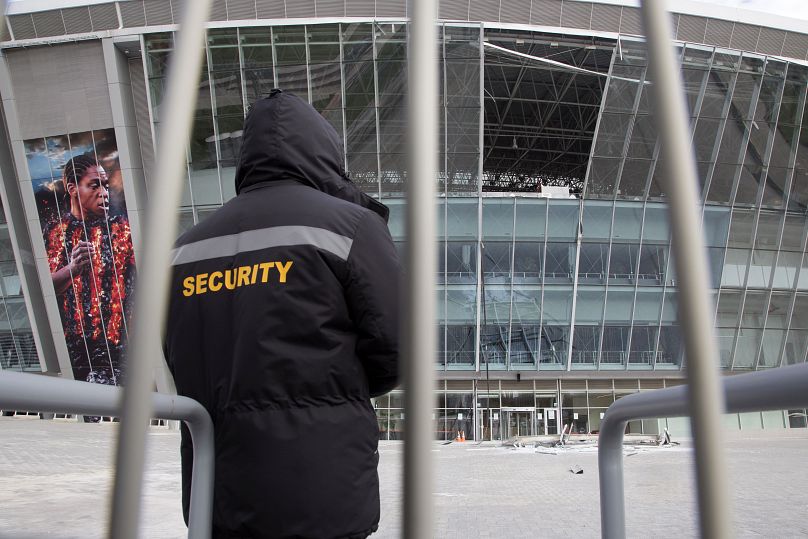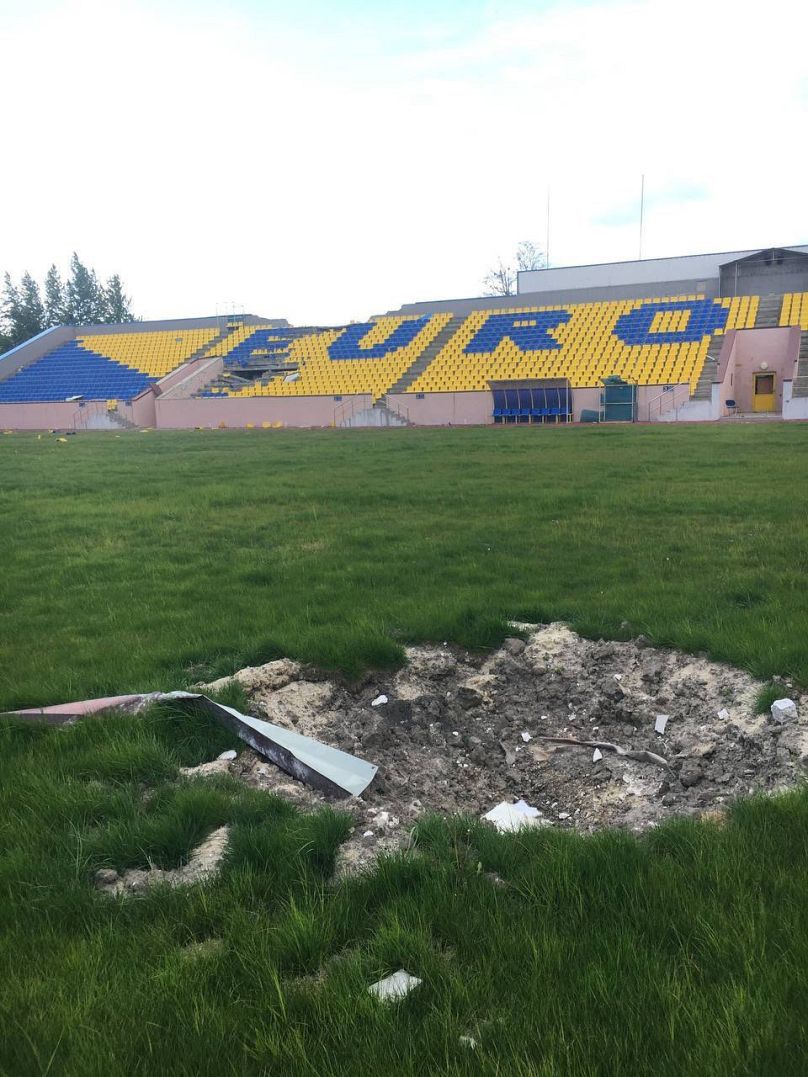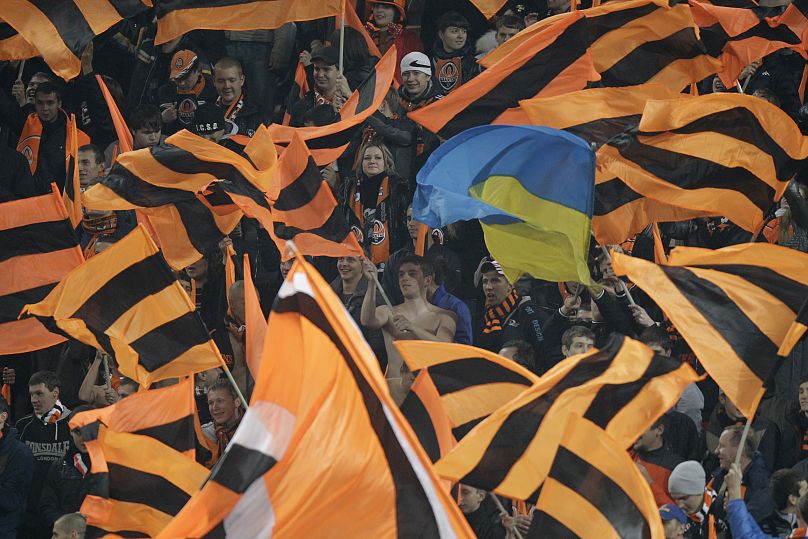Two of Ukraine's stadiums used for Euro 2012, which happened 10 years ago this week, have since been damaged by shelling.
Ten years since the Euro 2012 football extravaganza in Ukraine and Poland should have been the time for fond recollections of a memorable tournament.
Instead, it's turned into solemn eulogies for stadia in eastern Ukraine that have been damaged by war and left abandoned.
The tournament, with each of its 31 games watched by an average of 150 million people worldwide, was one of the biggest advertisements for Ukraine after it regained its independence from the Soviet Union in 1991.
Since then, Ukraine first saw Russia annex Crimea and support two breakaway so-called people’s republics in the eastern region of the Donbas in 2014.
Then Russia invaded Ukraine on 24 February this year, embarking on a campaign of death and devastation in an attempt to seize control of the country.
With Russian troops now focusing on the east of the country, with some of the fiercest battles of the war raging in Sievierodonetsk and Lysychansk, it was the country’s president who recalled Ukraine’s shining moment a decade ago.
“Exactly 10 years ago this day marked the start of EURO 2012 which brought together all Ukrainians, Poles and the vast majority of Europeans,” Volodymyr Zelenskyy remembered in an Instagram story on Wednesday night.
In Ukraine, the matches were held in four cities: Lviv, Kharkiv and Donetsk, while the final was held in the capital Kyiv.
Now, only the Kyiv and Lviv stadia remain untouched by the war.
Recalling the Donetsk stadium — the heavily damaged former home turf of Shakhtar, one of the country’s most successful clubs — Zelenskyy slammed the news out of the Donbas, where Russian-appointed authorities are reportedly wanting to create a separate football league with teams from the so-called DNR and LNR, Crimea and even part of Georgia.
In addition, the orange-black team colours of Shakhtar are now associated with the Russian St. George's ribbon, often used in combination with the letter Z as a symbol of the Kremlin's invasion.
The devastation of the Donbas Arena is in stark contrast with the images from just ten years ago when the stadium in the Lenin Comsomol park tipped the likes of France and England against each other or hosted the semi-final between Portugal and Spain that the latter won on penalties, progressing on to beat Italy 4-0 in the Kyiv final.
“It's only been 10 years and it feels like being in another world,” Zelenskyy said.
“10 years ago, our Donetsk was a strong, proud and developed city. And then Russia came. Now it’s a ghost town that has lost most people, thousands of lives, and absolutely all prospects.“
'Incredible summer' speaks of times past
The fact that Zelenskyy spoke passionately about a past sporting event is still the most important unimportant thing in Ukraine, even amidst the war — but also emblematic of the past that no longer exists, journalist and author of 1312: Among the Ultras James Montague told Euronews.
"Zelenskyy spoke about going to Donetsk to the games long before he was a politician, with friends, and talking about this incredible summer."
"In some respects that reflects that, although there were some grumblings about the corruption when the tournament was there, it was an incredible festival. People were out in the streets watching football. It was a beautiful moment for the country," Montague said.
Seeing some of the tournament’s stadia — many of which were built for the occasion — damaged or turned into ruins is particularly painful.
In Kharkiv, the Sonyachny stadium, built as a training ground for Euro 2012 as part of the Metalist Oblast Sports Complex that hosted three games of the tournament has come under fire and has been destroyed.
The 52,518-seat Donbas Arena — a stadium that was totemic for the nation during the European tournament as the Ukrainian national team played its group matches there — has been targeted by bombardments ever since 2014.
"Every few months you’d see artillery shells land on its pitch or outside, or it would be hit by an artillery shell. So it’s very much emblematic of the past that no longer exists," Montague said.
Meanwhile, the fans have become increasingly political, says Montague, who wrote about Ukrainian ultras in places like Mariupol and along the Donbas frontline.
"Now, I’m following on Telegram and Instagram a lot of the people that I met while writing 1213 and they all have NLAWs and they’re all on the frontline with their own militias or joining regular troops."
Football to resume in an attempt to return to normalcy
In many ways, recalling the 2012 tournament is also a longing for times before the ongoing conflict changed the course of the land, something that is the case with all war societies.
And like in other societies that have experienced war, Ukraine might take a long time to see it recover, with the outcome still difficult to predict.
"Even looking at Bosnia or Serbia, we are only beginning to see the medium-term outcomes of what war can do to a society. These things can take centuries."
"When it comes to football, a good example — the one that I know well from when I was reporting in the Middle East — is Iraq. This was a country that was in the civil war, torn apart," he said.
"There was the invasion of the Americans, there were sectarian issues as well. They still haven’t been able to play any international football in Iraq."
Yet, with announcements by Zelenskyy and the country’s national football association of the national league resuming in August, it might be the biggest signal of a desire to return to normalcy through the most popular sport in the country.
"One of the biggest flares you can send up into the sky and say 'we're getting back to normal' is to restart your football league."
"People are incredibly passionate about it — just look and see the recent attempt at qualifying for the World Cup, and before that the World Cup in Russia as well which was seen again as a chance to stick two fingers up at the Russians, effectively," Montague said.














